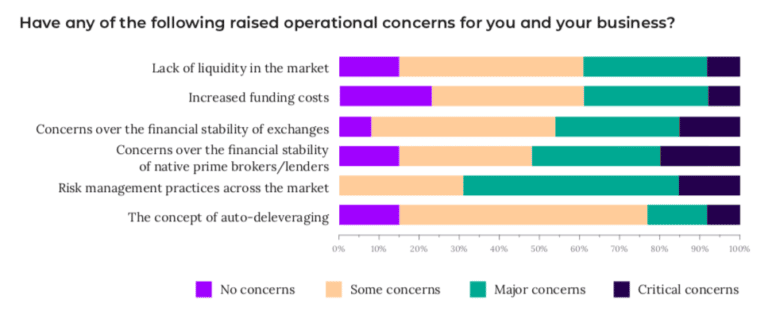The main consequence of recent falls in crypto prices will be the market moving closer to the infrastructure in traditional finance according to research from Acuiti, a management intelligence platform.
Half of the respondents, 50%, in the second Acuiti Cryptocurrency Derivatives Management Insight Report think the main consequence of the downturn in crypto valuations will be the market moving closer to TradFi infrastructure. Bitcoin has fallen to between $19,000-$23,000 since mid-June, from a high of more than $65,000 in November last year, wiping out $2 trillion of market cap according to the report.
In addition the majority of respondents, 59%, expect a more severe regulatory approach will be the main medium to long term effect. The research is based on the views of the Acuiti Crypto Derivatives Expert Network, a group of senior executives from across the globe from hedge funds, banks, brokers, prop traders, asset managers and exchanges.
The fall in valuations and the collapse of crypto hedge fund 3 Arrows Capital which required bailouts at associated firms has raised questions about how crypto markets operate. The survey found that the most critical concerns were financial stability of lenders and native prime brokers and risk management practices.

Source: Acuiti
“Ultimately the systemic impact of the collapse of a relatively small lender across the market reflects not only the need for regulation but also the risk that emanates from the significantly lower levels of capital committed to supporting the digital assets market when compared to traditional financial markets,” added the report. “There is a perceptible cooling on native crypto providers in their current form, as demonstrated by the concerns about exchanges’ and native brokers and lenders’ financial stability.”
However, the report also highlighted that it is notable that most firms in the market have withstood the shock.
The majority of the network, 58%, also believe that banks will come to play a strong role in permissioned decentralised finance (DeFi). However one third, 35%, expect banks not to engage at all with DeFi in the future.
Enhanced Digital Group
Increased institutionalisation was demonstrated by Enhanced Digital Group (EDG), which provides structured products to institutions in digital assets, raising $12.5m in a seed funding round in May this year.
Genesis is proud to announce its investment in Enhanced Digital Group which aims to provide institutions with structured products and derivative trading solutions that meet suitability characteristics of a diverse crypto client base.
Full release: https://t.co/FMqbe8feVw pic.twitter.com/jhFv4Fd1ys
— Genesis (@GenesisTrading) May 26, 2022
EDG was founded by bankers from traditional finance, including Chris Bae, a former management and investment committee member of UBS’s $40bn-plus alternative investment group. He also preciously led currency options and equity derivative trading desks at Goldman Sachs and Bank of America Merrill Lynch.
Bae, chief executive of EDG, told Markets Media that the firm was founded on the thesis that the asset class would institutionalise. He said: “We structure derivative packages to help solve asset and liability mismatches in the cryptocurrency universe and we definitely don’t see anyone else like us today.”
He continued that when the business started in October 2021, institutions could only invest in coins and EDG felt a slew of products would have to come to the market for institutions to solve individual liability perspectives or time horizons.

Chris Bae, EDG
“We saw a lack of financial engineering in the space,” added Bae. “We wanted to build products in a regulatory compliant manner and that has come to become very important.”
The volume of inbound enquiries from all over the world has grown remarkably according to Bae as crypto valuations have fallen and volatility has increased.
“In all markets, not just crypto, investors have a Cinderella moment when they think ‘I’ll get out before midnight’” he added.
EDG operates under the derivatives regulation of the US Commodity Futures Trading Commission and part of the funding round will be for regulatory capital.
“That is a big differentiator for us as CFTC swap exemption requires regulatory capital to be held unencumbered and that is what we have done,” said Bae. “What is really exciting for us in the next 12 months is that things that need to develop in the institutional ecosystem are happening.”
For example, there is a lack of credit provision in crypto, with no traditional finance products such as repos, and new players are coming to market to fix that gap.
Bae compared the current crypto markets to frontier markets in traditional finance, which are a level below emerging markets. He added: “That affects how you manage risk, and size and express trades.”
EDG’s funding round was led by WebN Group, a research-based incubator backed by Alan Howard, and Genesis, with additional investors New Form Capital, Nexo Ventures, Kenetic, BH Digital, Tribe Capital and IntoTheBlock founder Jesus Rodriguez.
Joshua Lim, head of derivatives at Genesis, said in a statement: “As the environment around cryptocurrency and blockchain continues to mature, we’ve observed a growing need for crypto-native firms capable of bridging the gap between traditional markets and this new financial ecosystem. EDG fills that gap by developing tailored strategies and financial products for institutional and retail investors that match their unique needs.”
Credit: Source link

































